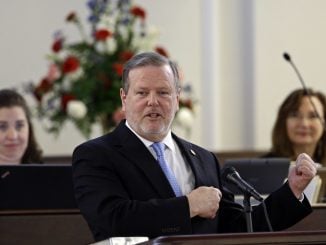
RALEIGH — North Carolina State Treasurer Brad Briner launched a comprehensive financial literacy initiative aimed at improving residents’ money management skills.
At the core of the new initiative is a free monthly newsletter featuring informative articles from the treasurer and his staff, along with guest columns from financial experts. The publication will address financial topics relevant to people of all ages and economic circumstances. Interested individuals can subscribe through a form available on the treasurer’s website.
The announcement came during an April 4 press conference held at Wake Technical Community College’s Scott Northern campus, coinciding with the beginning of Financial Literacy Month.
Joining Briner were Wake Tech Vice President of Enrollment and Student Services Brian Gann, state Sen. Amy Galey (R-Alamance), and Wake Tech students Noor Ul-aien and Ken Vreeland.
Gann noted that Wake Tech seeks to instill financial literacy among its students and for the current academic year, with more than 7,800 students receiving services related to financial management at the institution.
“No matter your age, no matter your background and no matter your salary, everybody deserves to know about finances and how they shape your life,” Briner said before recounting how his family struggled financially when he was young, leading to his interest in financial literacy.
Briner said that approximately $1.75 trillion in student debt exists nationwide, with many borrowers unable to repay their loans even years after graduation.
“Break that down and that means that each borrower, on average, owes $29,000,” Briner said. “What makes it even more startling is that these aren’t people who just graduated; these are people in their 30s, their 40s, their 50s who still have outstanding student debt.”
The treasurer also cited issues with credit card debt.
“Nationally, the average credit card debt is about $6,000 per family,” said Briner. “And in North Carolina, many of our families struggle with high-interest payments to keep them trapped in that cycle of debt. Without proper financial education, many people don’t realize how high interest rates and low minimum payments can turn a small debt into a long-term financial trap.”
In a release following the press conference, Briner cited a 2024 report that indicated “the level of financial literacy in the United States has been in the 50% range for eight consecutive years.”
“That means that half of the nation — and North Carolina by extension — lacks sufficient skills and knowledge about things such as borrowing, earning, spending and insuring,” he said.
Galey said financial literacy was more than “just being trained to be a good consumer.”
“Yes, the government wants people to be self-sufficient, capable of managing their finances to maximize their purchasing power and not to be dependent on others to sustain themselves,” Galey said. “That is, or should be, a core goal of government: help people get started then get out of their way.”
Galey also said financial literacy is about “understanding principles such as opportunity cost, scarcity of resources, and the value of time can help shape a more productive and balanced life.”
According to Briner’s press release, he will be attending events and visiting schools across the state to promote Financial Literacy Month, and the financial literacy program will “continue as a key component of his tenure as treasurer.”

